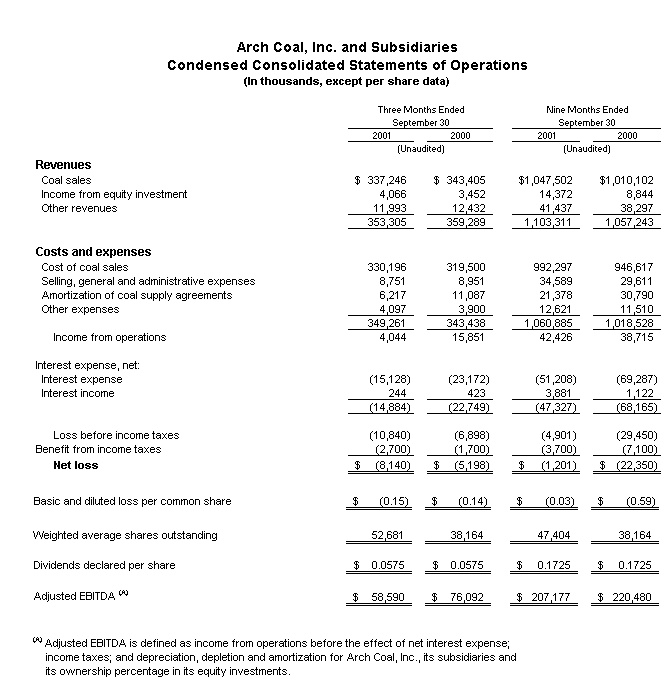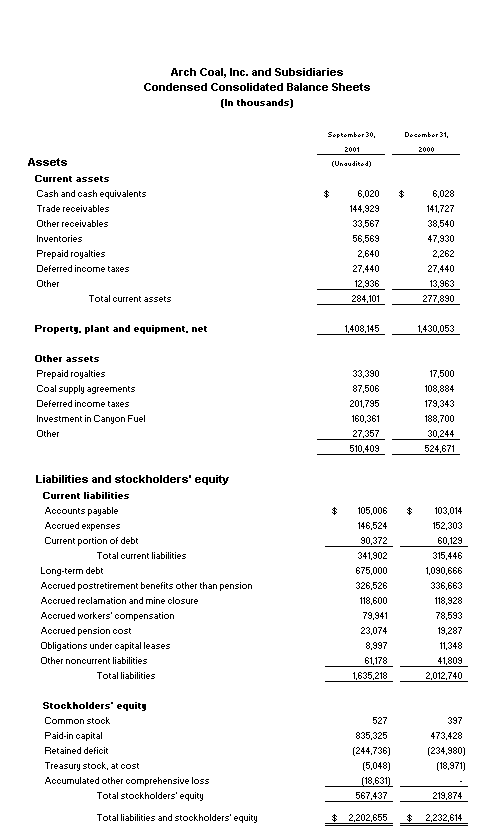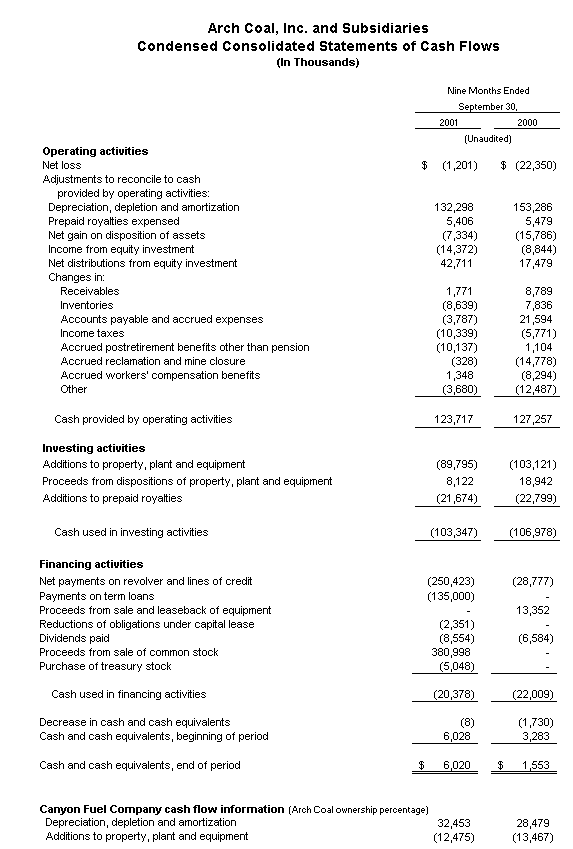Arch Coal, Inc. Reports Third Quarter Results
Highlights:
- Net loss of $8.1 million, or $.15 per share, vs. a net loss of $5.2 million, or $.14 per share, in 3Q00
- Adjusted EBITDA of $58.6 million, vs. $76.1 million in 3Q00
- Revenues of $353.3 million, vs. $359.3 million in 3Q00
- Coal sales of 27.1 million tons, vs. 26.8 million tons in 3Q00
- Remaining available production for 2002 committed and priced; also committed and priced a substantial amount of tonnage for delivery in 2003
- 357,200 shares repurchased at an average price of $14.13 per share
St. Louis - October 22, 2001 - Arch Coal, Inc. (NYSE:ACI) announced today that it had a net loss of $8.1 million, or $.15 per share, for its third quarter ended September 30, 2001. The company had previously announced that it expected to lose between $.15 and $.25 for the quarter. In comparison, Arch had a net loss of $5.2 million, or $.14 per share, in the same quarter of 2000.
The third quarter is traditionally the company's weakest earnings period due in part to the timing of miners' vacations and the scheduling of major maintenance projects during vacation periods. In addition, company results were adversely affected by a loss at the West Elk deep mine in Colorado, where production has been hampered by high levels of methane liberation, and the continuation of higher costs at the Samples mine in West Virginia resulting from a sandstone intrusion in the coal seam.
"We made significant progress on several fronts during the quarter just ended that should contribute to substantially stronger results in the future," said Steven F. Leer, Arch Coal's president and chief executive officer. "The performance of the West Elk mine improved steadily each month of the quarter as it successfully expanded its methane control efforts and increased productivity levels. In addition, we committed additional eastern and western tonnage for delivery in 2002 and 2003 at favorable pricing levels."
For the nine months ended September 30, 2001, Arch Coal had a net loss of $1.2 million, or $.03 per share, compared to a net loss of $22.4 million, or $.59 per share, for the same period of 2000. Total revenues for the first nine months of 2001 totaled $1,103.3 million and coal sales totaled 81.0 million tons, vs. $1,057.2 million and 79.4 million tons for the first nine months of 2000. Adjusted EBITDA for the first nine months of 2001 totaled $207.2 million, compared to $220.5 million in the same period of 2000.
Contract activity
During the quarter, Arch committed and priced its remaining available tonnage for 2002. The company currently expects to receive an average of between $30.00 and $30.50 per ton for its eastern sales volume in 2002, and between $7.00 and $7.25 per ton for its western sales volume in 2002.
The table below describes the company's contract activity related to its Central Appalachia and Powder River Basin production since the beginning of 2001.

"U.S. coal markets continue to enjoy very strong fundamentals," Leer said. "Many U.S. power producers are exploring longer term supply agreements with large, reliable and well positioned coal producers. We have already locked in pricing for our expected production in 2002 and a substantial amount of tonnage in 2003 as well."
Major factors
The Samples mine in southern West Virginia continues to experience higher costs as a result of a sandstone intrusion that has thinned the coal seam in the current reserve area. As a result, Samples experienced a $5.6 million loss during the quarter due to production shortfalls. The sandstone intrusion is expected to result in another loss at Samples in the fourth quarter.
"Early next year, the Samples mine expects to begin development work on a new reserve area with more favorable geology," Leer said. "We have yet to receive the necessary permits for these reserves, but expect to do so before the end of the year."
For the quarter, West Elk recorded a $2.3 million operating loss. However, the mine's performance improved steadily as the mine implemented a series of methane control procedures. During August and September, the mine produced more than 500,000 tons per month, or approximately 80% of normalized production, and it achieved break-even financial results in September. "While it is still too early to provide assurance that the West Elk mine's problems are resolved, we are pleased with its recent progress," Leer said. "We expect to build on this progress in the fourth quarter."
Leer added that most of the company's other mines are running well. Black Thunder, the company's largest mine, set a shipment record for the quarter.
Stock buyback program
On September 15, Arch announced that its board of directors had authorized the company to repurchase up to 6,000,000 shares of Arch Coal common stock. During the quarter, the company used $5.0 million to repurchase 357,200 shares of stock, at an average price of $14.13 per share. The timing of any additional purchases, and the exact number of shares to be purchased, will be dependent on market conditions.
Operating statistics
Regional analysis: Of the 27.1 million tons of coal that Arch sold during the third quarter, approximately 8.1 million tons originated at its eastern operations and 19.0 million tons originated at its western operations. Arch Coal had an average realized sales price of $12.44 per ton and average operating costs of $12.18 per ton. The eastern operations had an average realized sales price of $27.04 per ton and an average cost of $26.56 per ton during the quarter. The western operations had an average realized sales price of $6.22 per ton and an average cost of $6.01 per ton during the quarter. (Western operations data do not include the results of 65%-owned Canyon Fuel Company, which is accounted for on the equity method.)
Expected sales volume for the fourth quarter: Arch expects to sell approximately 8.6 million tons of coal in the fourth quarter of 2001 at its eastern operations. In the west, Arch expects to sell approximately 18.2 million tons of Powder River Basin coal and roughly 1.6 million tons of coal from its West Elk mine. Total sales (on a 100% basis) at Arch's 65%-owned Canyon Fuel operations in Utah are expected to be approximately 3.4 million tons in the fourth quarter.
Financial: Arch expects depreciation, depletion and amortization of between $55 million and $60 million in the fourth quarter. Capital expenditures are expected to total between $40 million and $45 million. (Projections for depreciation, depletion and amortization and capital expenditures include Arch's ownership percentage in Canyon Fuel Company.)
Earnings guidance: Arch had previously announced that it expected to break even for the last six months of 2001, with a third quarter loss expected to be offset by a comparable level of profit in the fourth quarter. As a result, the company currently expects to record a profit of between $.12 and $.18 per share in the fourth quarter.
Looking ahead
"As we prepare for 2002 and the improved coal pricing we will enjoy beginning in January, our top financial priority will be to run our mines efficiently," Leer said. "A materially improved revenue line is locked in. Now our focus must be to deliver these improvements to the bottom line through sound cost control."
In addition, the company will continue to negotiate contracts for its expected production in 2003 and beyond, according to Leer. "Contract pricing has moved in a narrow range for the past six months and remains at very attractive levels today," he said. "We expect pricing to remain strong for the foreseeable future."
Leer pointed to the modest increase in production so far this year as one reason for this positive outlook. "U.S. coal production was up approximately 24 million tons for the first six months of 2001," Leer said. "Given that government reports show that power generators pulled nearly 40 million tons out of stockpiles last year, we expect stockpiles to remain considerably below utility target levels entering 2002."
Excess capacity at coal-fired power plants is the lowest cost source of additional power, he added, and remained so even when gas prices briefly fell below $2 per million Btu's in September. "Electricity demand has increased in 49 of the last 50 years," Leer said. "We expect coal usage to increase and coal markets to remain tight even in today's sluggish economic environment."
Instability in world energy markets has focused renewed attention on domestic energy reserves and may translate into a central role for coal in America's future energy policies. "America has a 250-year supply of coal at current consumption rates, and technology is making coal usage more environmentally friendly all the time," Leer said. "Coal is a key resource in achieving greater energy independence for America."
A conference call concerning third quarter earnings will be webcast live today at 11 a.m. Eastern time. The conference call can be accessed via the "investor" section of the Arch Coal web site (www.archcoal.com).
Arch Coal is the nation's second largest coal producer with subsidiary operations in West Virginia, Kentucky, Virginia, Wyoming, Colorado and Utah. Through these operations, Arch Coal provides the fuel for approximately 6% of the electricity generated in the United States.
Definition: Adjusted EBITDA is presented above because it is a widely accepted financial indicator of a company's ability to incur and service debt. Adjusted EBITDA should not be considered in isolation or as an alternative to net income, operating income, cash flows from operations, or as a measure of a company's profitability, liquidity or performance under generally accepted accounting principles. Adjusted EBITDA is defined as income from operations before the effect of net interest expense, income taxes, and depreciation, depletion and amortization for Arch Coal, Inc., its subsidiaries and its ownership percentage in its equity investments.
Forward-Looking Statements: Statements in this press release which are not statements of historical fact are forward-looking statements within the "safe harbor" provision of the Private Securities Litigation Reform Act of 1995. These forward-looking statements are based on information available to, and expectations and assumptions deemed reasonable by, the company. Because these forward-looking statements are subject to various risks and uncertainties, actual results may differ materially from those projected in the statements. These expectations, assumptions and uncertainties include: the company's expectation of continued growth in the demand for electricity; belief that legislation and regulations relating to the Clean Air Act and the relatively higher costs of competing fuels will increase demand for its compliance and low-sulfur coal; expectation of continued improved market conditions for the price of coal; expectation that the company will continue to have adequate liquidity from its cash flow from operations, together with available borrowings under its credit facilities, to finance the company's working capital needs; a variety of operational, geologic, permitting, labor and weather related factors; and the other risks and uncertainties which are described from time to time in the company's reports filed with the Securities and Exchange Commission.


